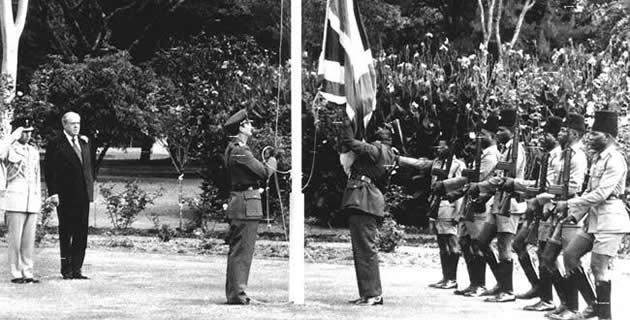Zimbabwe turns 37 with a lot to cheer about

Charity Ruzvidzo Syndication Writer
As Zimbabwe celebrates its 37th Independence anniversary, it is paramount to acknowledge major strides the nation has taken in empowering the youths.
Through various indigenisation and empowerment programmes, Government has provided young people with quality education and access to health among many other social amenities.
Independence Day, for most youths, is a day to reflect on tremendous sacrifices that were made by our heroes and heroines to liberate the country.
It is also a day to appreciate post-independence transformative measures taken to develop and empower them.
Zimbabwe’s outstanding education system is evidence of Government’s efforts to enhance the youths’ livelihoods.
The country has built many primary and secondary schools in addition to a few that were available before independence.
Racial discrimination that hindered black citizens from accessing education is now a tale of the past.
Both urban and rural youths are now able to access education at any school of their choice.
Government recently introduced the Science, Engineering, Technology and Mathematics (STEM) initiative that offers free education to senior high school students enrolling to study a combination of Science subjects.
In addition to its attempt to continuously produce an independent youth, Government recently introduced a new curriculum that promotes a wide range of extra curricula activities.
The new curriculum will produce diverse and well-equipped students.
Apart from primary and secondary schools, Government has built higher and tertiary institutions such as colleges and universities to increase youth empowerment academically.
Zimbabwe had only one university before independence, the then University College of Rhodesia, now University of Zimbabwe.
Now the country boasts of 13 state universities and six private ones.
Among others, the universities include Midlands State University, the National University of Science and Technology, Bindura University of Science Education, Chinhoyi University of Technology, Great Zimbabwe University and Lupane State University, and more.
Government also came up with a scholarship programme known as the Presidential Scholarship Scheme that assists bright students from vulnerable families to study abroad.
The number of vocational training centres has also increased.
These centres are pivotal to youth and economic empowerment in Zimbabwe as they offer opportunities to those who may have failed to attend higher and tertiary education.
Zanu-PF national secretary for Youth Affairs Cde Kudzayi Chipanga said youths should not take independence for granted.
“Young people are beneficiaries of Independence and we greatly appreciate the sacrifices put into ensuring freedom for all Zimbabweans. We should not take this lightly. It is our duty as young people to safeguard our Independence,” he said.
Cde Chipanga said since the attainment of Independence, youths have benefited from various agrarian programmes in the country.
“Many youths have benefited from the land redistribution programme, which has seen quite a number of young people becoming land owners. Also, some are benefiting from the Command Agriculture Scheme and the Presidential Inputs Scheme to productively use their land,” Cde Chipanga said.
He said land reform, indigenisation and empowerment schemes were a reflection of efforts put in place to empower and benefit the black majority, especially young people.
“We have young farmers who are doing well at their farms. Some major in tobacco production, sugarcane or maize production. The high production from these young farmers shows how effective the programmes set to empower the youths are proving to be.”
Government introduced the 51 percent local ownership of shares in the mining sector and foreign-owned companies.
This was done to correct imbalances from the colonial era.
Zimbabwe is endowed with mineral resources that include gold, chrome, iron, platinum and diamonds.
More minerals, which contribute significantly to the growth of the economy continue to be discovered.
Cde Chipanga said the country’s mining sector has also paved way for youth participation.
“The Government is introducing policies that align with small-scale miners. In this case, most small-scale miners are young people. They are being afforded a chance to explore the sector and contribute to the country’s development,” he said.
To assist youths with their various projects, the Ministry of Youth, Indigenisation and Empowerment has availed financial assistance through loans.
Last year, CBZ — which also works with the Youth ministry — set aside $35 000 for a young entrepreneur programme for seed funding and training for aspiring youth business ventures.
The ministry is mandated to achieve true empowerment of Zimbabwean youths and indigenous citizens.
Its mission is to develop, promote and implement policies and programmes for the empowerment of youths and indigenous citizens to achieve sustainable and equitable development.
The ministry has also taken the initiative to identify, acknowledge and celebrate young people whose innovation, resilience and enterprise has created employment and contributed to economic growth.
Since August last year, 39 385 entrepreneurs have been identified, according to the Zimbabwe Champions and Heroes of the Economic Empowerment Revolution (ZimCHEER) magazine.
These entrepreneurs have created 93 692 jobs. Independence has opened doors for the majority of youths to participate in the country’s politics.
This is evidenced by the increasing number of young parliamentarians, councillors and leaders in various Government positions.
“The country’s political system has opened room for young people to take part. For instance, the Zanu-PF youth wing was traditionally led by older people. This has changed as most of the leaders of the wing now comprise of young people,” said Cde Chipanga. Farai Murombi (25), a Harare youth applauded Independence for bringing freedom to the majority.
“I am grateful to those who fought the liberation struggle. They opened windows of opportunities which were once considered impossible for the black majority. As a young person in a free Zimbabwe, I am now able to venture into whatever business l desire,” said Murombi.
For Samantha Ndlovu (23), Independence means equal child rights.
“Before Independence, women and girls were not given equal opportunities as their male counterparts. This is no longer the case as many women are now educated as much as men,” she said.
As always alluded to by President Mugabe, the youths are the leaders of tomorrow hence should be afforded an environment to embark on economic, political and social transformation.
The past 37 years are evidence to this! — Zimpapers Syndication.








Comments